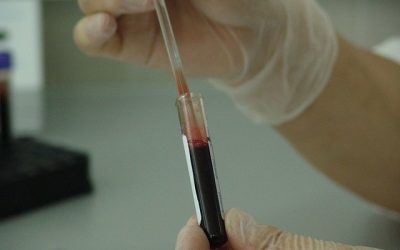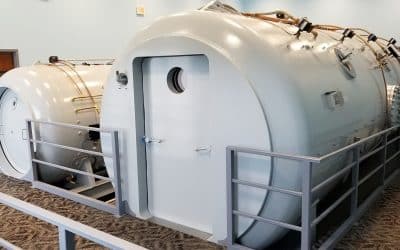Abstract As part of a placebo-controlled study, high-resolution measurement methods were used to examine, on the basis of representative functional characteristics of microcirculation, whether and to what extent six different, commercially available, physical...
Inflammatory Bowel Disease
Explore the latest research on the use of Hyperbaric Oxygen Therapy (HBOT) to treat Inflammatory Bowel Disease. Extivita maintains an extensive publication database for Inflammatory Bowel Disease and various other indications with therapies such as Hyperbaric Oxygen Therapy, Neurofeedback, Nutritional IV Therapy, Infrared Sauna, and Pulsed Electromagnetic Field Therapy. Explore our database on Acne and Hyperbaric Oxygen Therapy aka, HBOT, below.
For a complete list of indications treated at Extivita, explore the conditions we treat.
Hyperbaric oxygen therapy does not improve the effects of standardized treatment in a severe attack of ulcerative colitis: a prospective randomized study.
Complementary therapy options are needed in the treatment of active ulcerative colitis (UC). Hyperbaric oxygen therapy (HBOT) has been shown to have positive effects in experimental models of colitis and perianal Crohn’s disease. In the present prospective randomized open-label study, HBOT in addition to conventional medical treatment was compared with conventional treatment alone. The primary objective in this study was improved clinical outcome evaluated by Mayo score, laboratory tests and fecal weight. The secondary objectives were improvement in health-related quality of life, avoidance of colectomy and evaluation of HBOT safety. The authors found no statistically significant differences between the treatment groups in any of the assessed variables.
Hyperbaric oxygen therapy does not improve the effects of standardized treatment in a severe attack of ulcerative colitis: a prospective randomized study.
Complementary therapy options are needed in the treatment of active ulcerative colitis (UC). Hyperbaric oxygen therapy (HBOT) has been shown to have positive effects in experimental models of colitis and perianal Crohn’s disease. In the present prospective randomized open-label study, HBOT in addition to conventional medical treatment was compared with conventional treatment alone. The primary objective in this study was improved clinical outcome evaluated by Mayo score, laboratory tests and fecal weight. The secondary objectives were improvement in health-related quality of life, avoidance of colectomy and evaluation of HBOT safety. The authors found no statistically significant differences between the treatment groups in any of the assessed variables.
Efficacy of hyperbaric oxygen in patients with Crohn’s disease: two case reports.
Crohn’s disease is an inflammatory disease of the gastrointestinal tract, usually involving the ileum, that can lead to debilitating symptoms of abdominal pain, diarrhea and malabsorption during acute exacerbations. Because there is no known cause of the illness, treatment is based upon symptomatology and may ultimately require bowel resection if response to medical therapy is inadequate. Treatment with hyperbaric oxygen has shown promise in the reduction of inflammation associated with acute exacerbations of Crohn’s disease, with alleviation of symptoms and an improvement in quality of life. We present two cases of pediatric patients with exacerbations of Crohn’s disease who underwent cycles of hyperbaric oxygen therapy.
A favourable response to surgical intervention and hyperbaric oxygen therapy in pyoderma gangrenosum.
Pyoderma gangrenosum (PG) is a neutrophilic dermatosis characterised with ulcerations. Inflammatory bowel diseases (ulcerative colitis and Crohn’s disease) and haematologic diseases (leukaemia, preleukaemia and monoclonal gammopathy) have been reported in about 40-50% of PG patients in whom the treatment of the underlying disease is important for the improvement of the lesions. We herein report a colorectal adenocarcinoma patient with PG, who responded partially to topical treatments and systemic immunosuppressants and healed completely with the aid of surgical wound repair and hyperbaric oxygen therapy.
[Hyperbaric oxygen in the treatment of perineal Crohn’s disease era of infliximab: a renewal interest?].
Despite the growing number of therapeutic methods and the recent introduction of new drugs more active in the therapeutic arsenal, lesions of the ano-perineal Crohn’s disease remains difficult to support. Hyperbaric oxygen (HBO) was made before the era of infliximab, an interesting therapeutic approach in which the current position remains unclear. To assess HBO efficacy in the treatment of anal fistulas refractory Crohn’s disease. Literature review. Hyperbaric oxygen therapy was used in the 90’s when the biotherapy was not part of the armamentarium for Crohn’s disease. Research conducted has identified only nine publications evaluating the efficacy of hyperbaric oxygen therapy in the treatment of anal fistulas refractory Crohn’s disease.
HBOT for inflammatory bowel disease
Traditionally, hyperbaric oxygen treatment (HBOT) has been used to treat a limited repertoire of disease, including decompression sickness and healing of problem wounds. However, some investigators have used HBOT to treat inflammatory bowel disease (IBD), including Crohn’s disease and ulcerative colitis.
Comprehensive searches were conducted in 8 scientific databases through 2011 to identify publications using HBOT in IBD. Human studies and animal models were collated separately.
The influence of deficiencies of essential trace elements and vitamins on the course of Crohn’s disease
Abstract In patients with Crohn's Disease (CD), malnutrition is frequently observed and is an important complication, frequently associated with nutritional deficiencies, especially vitamins (both water- and fat-soluble) and essential trace elements. It is often a...
Hyperbaric oxygen treatment for inflammatory bowel disease: a systematic review and analysis.
Traditionally, hyperbaric oxygen treatment (HBOT) has been used to treat a limited repertoire of disease, including decompression sickness and healing of problem wounds. However, some investigators have used HBOT to treat inflammatory bowel disease (IBD), including Crohn’s disease and ulcerative colitis. Comprehensive searches were conducted in 8 scientific databases through 2011 to identify publications using HBOT in IBD. Human studies and animal models were collated separately. Thirteen studies of HBOT in Crohn’s disease and 6 studies in ulcerative colitis were identified. In all studies, participants had severe disease refractory to standard medical treatments, including corticosteroids, immunomodulators and anti-inflammatory medications.



